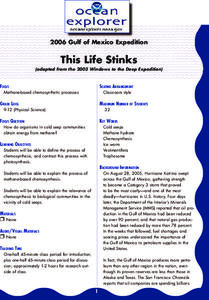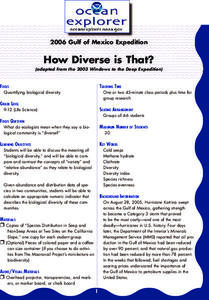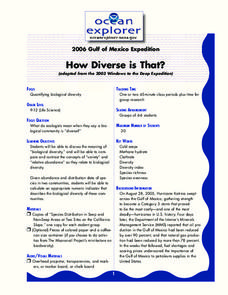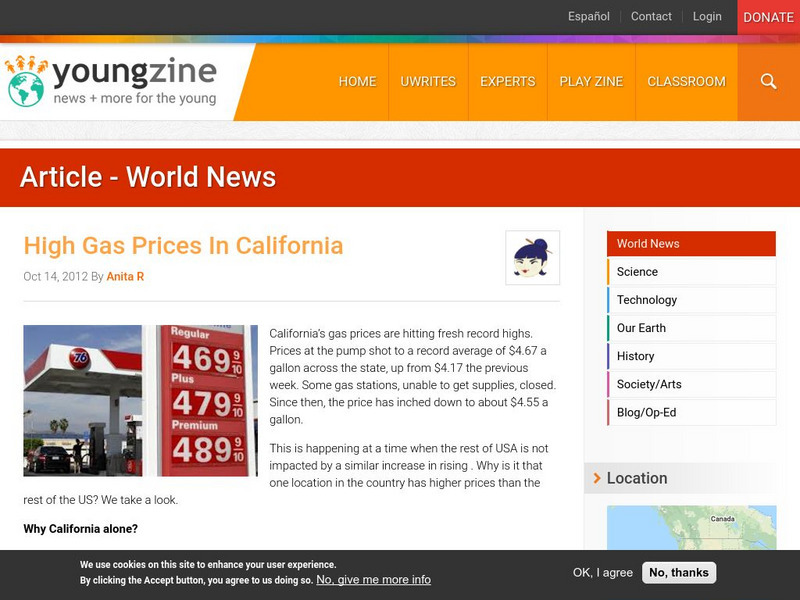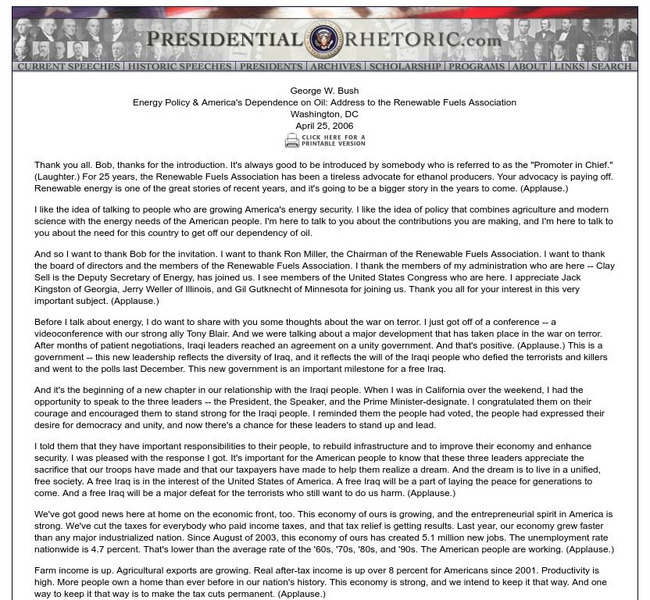Curated OER
Endangered Species
Ninth graders graph data in order to compare the number of extinct species and a rise in human population. They analyze the data collected. Students are encouraged to infer the relationship.
Curated OER
Fossil Fuels: Understanding a Nonrenewable Resource
Incorporate fossil fuel issues into your curriculum with these lesson plan ideas.
Curated OER
Living in Hurricane Country
Students examine how hurricanes grow and their strength levels through an interactive program. They define terms associated with hurricanes and how the public is affected by the storms.
Curated OER
Cartoons in the Classroom: Stagflation
What is stagflation? Have your social studies class examine this political cartoon to define stagflation and understand recession as its defined in a political context. This worksheet would be a great warm up activity, perfect for extra...
Curated OER
CSI on the Deep Reef
After some instruction, small groups prepare a written report on chemotrophic organisms. Though not clearly mentioned, this resource would work best if groups have the Internet available to research the vocabulary and different organisms...
Curated OER
This Life Stinks
Chemosynthetic communities of cold seep areas are considered in this lesson. Working in collaborative groups, marine biology or oceanography learners research and prepare a report about oxidation-reduction reactions involved with...
Curated OER
Life is Weird
Separate your science class into small groups and assign each a specific deep-sea organism to research. The class will learn about all of the organisms as each group presents their assigned animal. Following their presentations, you can...
Curated OER
How Diverse is That?
After reviewing biodiversity, learners work in small groups to analyze actual species distribution data. They learn to calculate the Shannon-Weaver diversity index for different communities. Though not particularly engaging, the content...
Curated OER
Filling Up
In this filling up worksheet, students calculate the E85 per gasoline-gallon equivalent price to the E85 price per gallon to complete a chart of "alternative fuel". They use the data along with the price per gallon of gasoline to plot...
Curated OER
CSI on the Deep Reef
Students read about, discuss, and research chemotrophic organisms. In this chemosynthesis lesson, students discuss the differences between photosynthesis and chemosynthesis. They learn that chemosynthesis includes a variety of chemical...
Curated OER
How Diverse is That?
Students discuss biological diversity in ocean communities. In this diversity lesson, students examine the variety of organisms compared to relative abundance. They will write an analysis and discuss their findings with the class.
Curated OER
Pump it Up
Learners explore the rising cost of gasoline and how it impacts people around the world differently.
Curated OER
This Life Stinks
High schoolers study how organisms that live in cold seep communities get energy from methane. In this organism lesson students write a brief report and identify oxidation reduction reactions and explain if these are dependent of...
Curated OER
Life is Weird
Learners describe features of cold seep communities and list organisms that can be found in these communities. In this exploratory lesson plan students complete an activity and describe the process of chemosynthesis.
Curated OER
How Much Does it Cost to Light Your School?
Students explore the cost of electricity used to light their classrooms. They compute the cost of electricity as well as the number of kilowatt hours of electricity used during the school year. Students compute the number of tons of coal...
Youngzine
Youngzine: Week of 10 22 12: High Gas Prices in California
Californians have been hit by high gas prices at the pump. But the rest of the U.S seems to be doing alright. A fascinating look at supply and demand, and what makes California's situation unique. [2:00]
PBS
Pbs News Hour: Senate Reacts to Gas Prices
In the wake of rising gas prices and oil company profits, the Senate reacts with proposals to help consumers. There is also a discussion between experts about gas prices, profits, solutions, etc. Transcripts, audio and video of reports...
US Energy Information Administration
Energy Information Administration: The 1973 Oil Embargo
The Energy Information Administration provides a short summary of the energy crisis of 1973 and a slide show with charts of oil and energy prices, production, and usage since the crisis.
CBS
Cbs News: Calif. Demands Answers on Oil Prices
News article chronicles the Attorney General of California's investigation into oil prices. Also included with this article are video reports, interactive activities such as state-by-state gas prices, things motorists should know, photo...
PBS
Pbs News Hour: America's Energy Addiction
In a February, 2006, report, NewsHour presents a discussion of George W. Bush's energy policy, rising gas prices, alternative energy sources, etc. Transcript, audio and video of report are available.
Digital History
Digital History: Oil Embargo
This site has an overview of the causes of the 1970s energy and oil crisis.
Other
Presidential Rhetoric: George W. Bush: Energy Policy
President George W. Bush discusses his energy policy, American's dependence on oil and alternative fuel in this April, 2006, speech.







